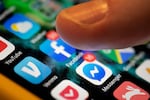
Loneliness, not screen time, is keeping college students up at night, according to a new study from Oregon State University.
Jenny Kane / AP
When it comes to sleep, screen time is often demonized. Several studies have already shown a link between excessive screen time and insomnia. And young adults, especially, are often lectured about the amount of time they spend on smartphones or tablets.
But according to a new Oregon State University study, insomnia among college students has a much stronger association with feelings of loneliness than it does with time spent looking at electronic devices.
“We expected [students] might have more insomnia symptoms because of screen time,” said John Richmond Sy, lead author of the study and recent OSU graduate. “But what we found is that loneliness in of itself was a predictor of insomnia regardless of screen time.”
College students are already prone to feelings of isolation and report higher use of electronic devices than other populations, Sy said. On top of that, young people in college are notoriously sleep-deprived — often staying up late to study for exams or to finish school projects.
Previous studies have shown that insomnia severely compromises learning among college students. Among this group, a continued lack of sleep is associated with poor mental and physical health conditions, moodiness, lower grade point averages and a higher risk of involvement in car crashes.
In the OSU study, Sy and other researchers sought to learn more about the relationship between loneliness, screen time and insomnia among college students.
The study surveyed more than 1,000 undergraduate students attending OSU and Chaminade University of Honolulu between April of 2021 and September 2022. Questionnaires asked students about their sleep patterns, measured their perceived loneliness and looked at how long and what they used their electronic devices for on school days.
More than a third of respondents, 35%, reported high levels of loneliness. And nearly two thirds of that group, 63% said they also experienced symptoms associated with insomnia. That’s nearly twice the rate of sleeplessness reported by college students who had lower levels of loneliness.
“Because of this perceived social isolation, you might wake up a little bit more, you might have a harder time falling asleep,” said Sy of some of the symptoms of insomnia students felt. “Rumination is also associated with loneliness, so that could also prevent somebody from falling asleep quickly. And lonelier people have higher stress sensitivity.”
The amount of screen time did not appear to have an effect on lonelier students' insomnia.
That’s not to say that extended periods looking at screens had no effect on college students at all. Students who reported low levels of loneliness did feel the impact of screen time at bedtime, but Sy said the threshold to begin feeling those effects was high.
“Eight to 10 hours of total screen time a day was what we found to be the maximum before there’s a higher prevalence of insomnia,” said Sy.
In order to reduce both sleeplessness and loneliness and promote overall well-being among college students, the study recommends college administrators invest more in mental health resources for students and develop activities that bring students together and encourage a sense of belonging.
